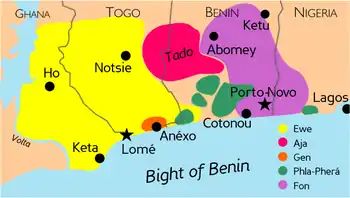Adja language
The Aja language is a Gbe language spoken by the Aja people of Benin, Togo, Ghana, Nigeria and Gabon. In Gabon, they are mostly migrants.
| Aja | |
|---|---|
| Adja | |
| Native to | Benin, Togo, Ghana, Nigeria, Gabon |
| Ethnicity | Aja people |
Native speakers | 550,000 (2006–2012)[1] |
| Official status | |
Recognised minority language in | |
| Language codes | |
| ISO 639-3 | ajg |
| Glottolog | ajab1235 |
 The distribution of the major Gbe dialect areas (after Capo 1988, 1991) | |
it is closely related to other Gbe languages such as Ewe, Mina, Fon, and Phla Phera.
Phonology
Consonants
| Labial | Alveolar | Retroflex | Post-alv./ Palatal |
Velar | Labial- velar |
Uvular | ||
|---|---|---|---|---|---|---|---|---|
| Nasal | [m] | [n] | [ɲ] | ŋ | ||||
| Plosive/ Affricate |
voiceless | p | t | t͡ʃ | k | k͡p | ||
| voiced | b | d | ɖ | d͡ʒ | ɡ | ɡ͡b | ||
| Fricative | voiceless | f | s | ʃ | χ | |||
| voiced | v | z | ɣ | ʁ | ||||
| Approximant | l ~ [r] | j | w | |||||
- Voiced consonants /b, ɖ, j/ are heard as nasal sonorant sounds [m, n, ɲ] when followed by a nasal vowel.
- /l/ is heard as a rhotic trill [r] when after alveolar, retroflex or post-alveolar consonants.
- Sounds /s/ and /z/ are heard as post-alveolar [ʃ], [ʒ] when preceding /i/.
- Approximant sounds /l, w/ may also be nasalized as [l̃, w̃] when preceding or following nasal vowels.
- Some linguists have also attested the nasal sound [ɲ], and labialized uvular sounds, [χʷ] and [ʁʷ], as separate phonemes.[2]
Comparison
Aja
Agbetɔwo pleŋu vanɔ gbɛmɛ ko vovoɖeka gbeswɛgbeswɛ, sɔto amɛnyinyi ko acɛwo gomɛ; wo xɔnɔ susunywin ko jimɛnywi so esexwe. Wo ɖo a wa nɔvi ɖaɖa wowo nɔnɔwo gbɔ.
Ewe
This text is written in the Ewe language: "Wodzi amegbetɔwo katã ablɔɖeviwoe eye wodzena bubu kple gomekpɔkpɔ sɔsɔe. Susu kple dzitsinya le wo dometɔ ɖesiaɖe si eyata wodze be woanɔ anyi le ɖekawɔwɔ blibo me.ne"
In English, it roughly translates to: "Wodzi has bought some shoes, clothes, and a bag. Come and see them at her house, and if you like them, you can buy them at a discount."
This text is written in the Ewe language: "Agbetɔwo pleŋu vanɔ gbɛmɛ ko vovoɖeka gbeswɛgbeswɛ, sɔto amɛnyinyi ko acɛwo gomɛ; wo xɔnɔ susunywin ko jimɛnywi so esexwe. Wo ɖo a wa nɔvi ɖaɖa wowo nɔnɔwo gbɔ."
In English, it roughly translates to: "You are like a fruit tree planted in fertile soil, and therefore bears good fruit; your words are sweet to the ears. Your ways are pleasant and admirable."
References
- Aja at Ethnologue (18th ed., 2015) (subscription required)
- Morley, Eric A. (2011). A Grammar of Ajagbe.